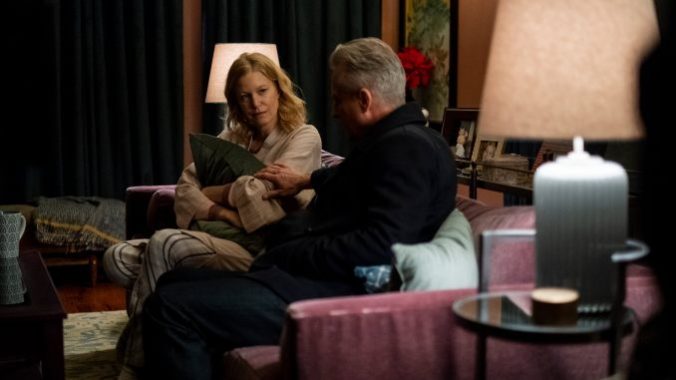Single-Location Home Invasion Thriller The Apology Is More Scattered Than Scary

The frigid chill of an escalating snow storm keeps two lead characters confined to a single location in The Apology, writer-director Alison Star Locke’s debut feature. Set during Christmastime, the film ostensibly aims to achieve a creepy-cozy holiday horror ambiance—à la the 1974 blueprint Black Christmas or recent entry The Lodge—buts its capsule setting and sparse plot struggle to convey a compelling story. Even with intense performances from Anna Gunn (Breaking Bad) and Linus Roache (Law & Order) guiding the action, the film would be far more effective as a taut short than a filled-out feature.
Preparing to host her first Christmas dinner in two decades, former alcoholic Darlene (Gunn) has much more to worry about than serving up the perfect holiday feast. This Christmas also marks the twentieth one she’s endured since the disappearance of her 16-year-old daughter Sally, who, in her grief-stricken naivete, she still hopes to reunite with one day. Despite the support of her best friend Gretchen (a tragically under-utilized Janeane Garofalo), the weight of this depressing anniversary nearly drives Darlene to fall off the wagon. Just as she’s about to imbibe her secret liquor stash, though, an unexpected guest arrives. Her estranged brother-in-law Jack (Roache) pops by for a visit (inspired in part by car trouble), offering what at first seems like much-needed company on a blue Christmas Eve. Yet Jack seems oddly invested in dredging up old memories of Sally and the mystery that’s long haunted their family, rather than taking Darlene’s mind off of these dark thoughts. As the film’s title suggests, Jack has a confession to make—and the raging blizzard, severed landline and inexplicably absent cell phones trap the two in a grisly standoff fueled by rage, remorse and vengeance.
The Apology starts strong before it begins to fizzle. The threads it begins to weave together—of the real-world impact of true crime content, the fear of being a “bad” mother, the validity of vigilantism—tie into worthwhile cultural inquiries. However, these themes are largely discarded to make room for an uninspired game of cat and mouse. Even as the power dynamic oscillates between Darlene and Jack, it becomes increasingly clear that the film is only interested in serving up the same tepid platitudes about patriarchal violence against women. At the same time, lacking the boldness of cathartic revenge-thriller fantasy, The Apology adopts a baffling approach that adheres to bland notions of “working within the system” to attain proper justice. If the film isn’t committed to exploring the thorny truth of cold cases being churned into consumable content, why should it be restricted by moral righteousness as it’s laid out by our deeply flawed judicial system?
-

-

-

-

-

-

-

-

-

-

-

-

-

-

-

-

-

-

-

-

-

-

-

-

-

-

-

-

-

-

-

-

-

-

-

-

-

-

-

-








































